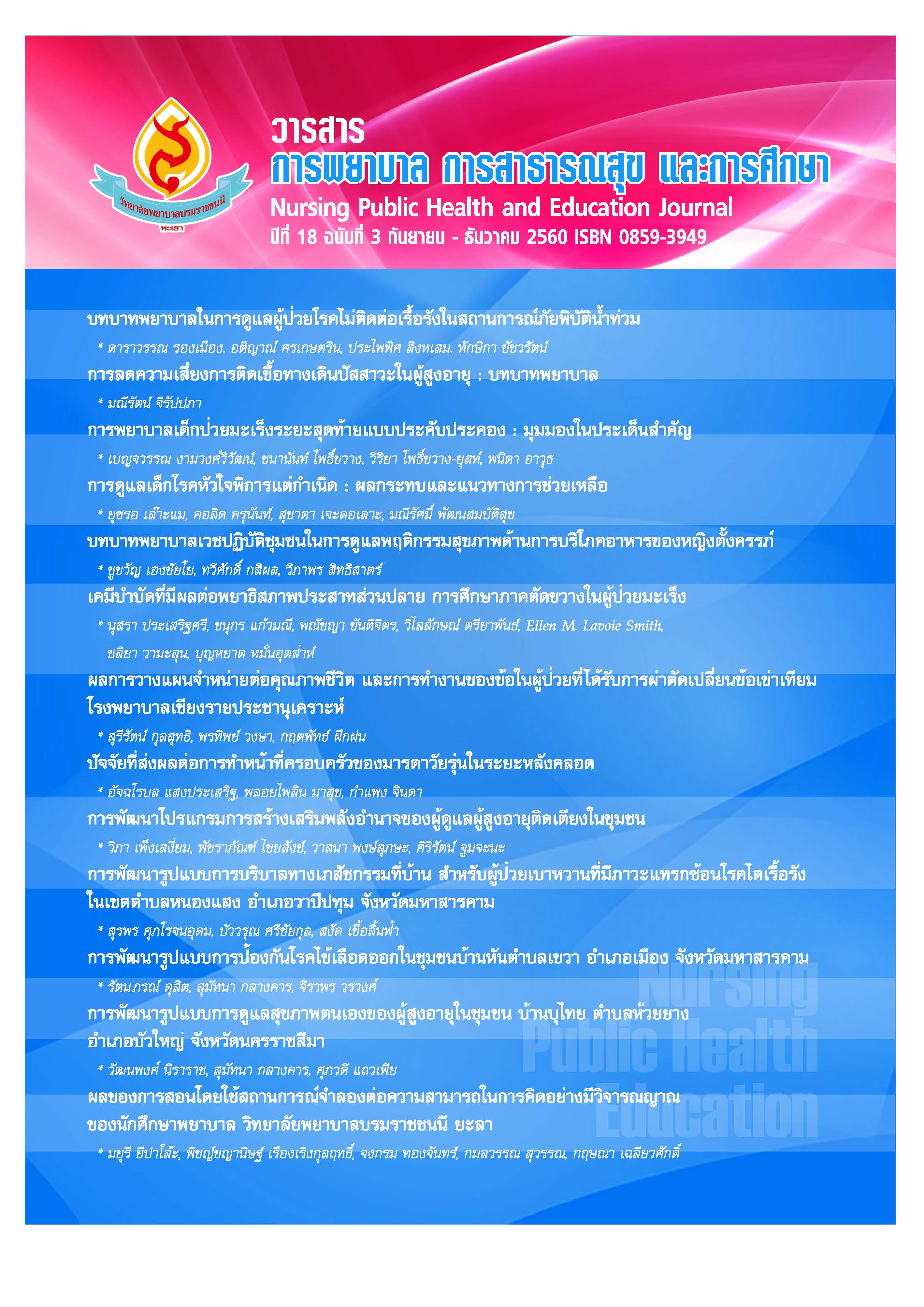การพยาบาลเด็กป่วยมะเร็งระยะสุดท้ายแบบประคับประคอง : มุมมองในประเด็นสำคัญ Palliative Nursing Care in Children with Cancer at the End of Life : Critical Perspectives
คำสำคัญ:
การพยาบาลแบบประคับประคอง, เด็กป่วยโรคมะเร็งระยะสุดท้าย, Palliative Nursing Care, Children with Cancer, End of Lifeบทคัดย่อ
การดูแลผู้ป่วยในระยะสุดท้ายแบบประคับประคองเป็นส่วนหนึ่งของแผนพัฒนาระบบบริการสุขภาพ (Service Plan) พ.ศ. 2561-2565 บทความนี้มีวัตถุประสงค์เพื่อถ่ายทอดความรู้ เกี่ยวกับการพยาบาลเด็กป่วยมะเร็งระยะสุดท้ายแบบประคับประคอง ในการพยาบาลเด็กที่ป่วยเป็นโรคมะเร็งนั้น เด็กจำเป็นต้องได้รับการดูแลรักษาแบบประคับประคองตั้งแต่รับทราบว่าเป็นโรคมะเร็งจนกระทั่งถึงในระยะสุดท้ายเพื่อความมีศักดิ์ศรีของความเป็นมนุษย์และคุณภาพชีวิตที่ดีทางด้านร่างกาย จิตวิญญาณ สังคมของเด็กและครอบครัวให้มากที่สุด ซึ่งมุมมองและประเด็นที่สำคัญที่พยาบาลควรนำไปประยุกต์ใช้ในการให้การดูแลเด็กที่ป่วยมะเร็งระยะสุดท้ายแบบประคับประคอง มีดังนี้ 1) อุบัติการณ์อาการปวดและรบกวนของผู้ป่วยเด็กที่เป็นมะเร็งในระยะสุดท้าย 2) การบริหารจัดการความปวดซึ่งประกอบ ด้วยการประเมินและการจัดการความปวด 3) การบริหารจัดการอาการที่เกี่ยวข้องกับโรค 4) การพยาบาลในด้านการสนับสนุนดูแลทางจิตวิญญาณของผู้ป่วย และครอบครัว 5) การพยาบาลเด็กมะเร็งในระยะสุดท้ายแบบประคับประคองต้องเน้นชุมชนเป็นหลัก 6) ความสำเร็จของการพยาบาลผู้ป่วยเด็กในระยะสุดท้ายแบบประคับประคองอยู่ที่การสื่อสาร 7) การดูแลผู้ป่วยควรเน้นผู้ป่วยและครอบครัวเป็นศูนย์กลาง รวมถึงเน้นความเป็นปัจเจกบุคคลของผู้ป่วย และ 8)รูปแบบการพยาบาลแบบประคับประคองในหน่วยงาน
คำสำคัญ : การพยาบาลแบบประคับประคอง เด็กป่วยโรคมะเร็งระยะสุดท้าย
Palliative care is one among health care services of national health service plan of Thailand from 2561-2565 B.E. This article is aimed to distribute the knowledge about palliative nursing care in children with cancer at the end of life. In nursing care for children with cancer, the palliative care should be given to children from the time of cancer diagnosis until the end of life for the dignity and quality of life in relation to physical, psycho-spiritual, social well-being of children and family. In providing nursing care at the end of life to children and families nurses should consider following critical perspectives. 1) Incidence of pain and symptoms of children with cancer at the end of life. 2) Pain management including pain assessment and pain management. 3) Symptom management. 4) Nursing care for psycho-spiritual support to children and family. 5) Palliative nursing care in children with cancer at the end of life directed to community-based approach. 6) Communication as a key to success of palliative nursing care in children with cancer at the end of life. 7) Palliative care emphasizing patient- and family- centeredness as well as individualized care. 8) The model of palliative nursing care in children with cancer at the end of life in the organization.
Key words : Palliative Nursing Care, Children with Cancer, End of Life



